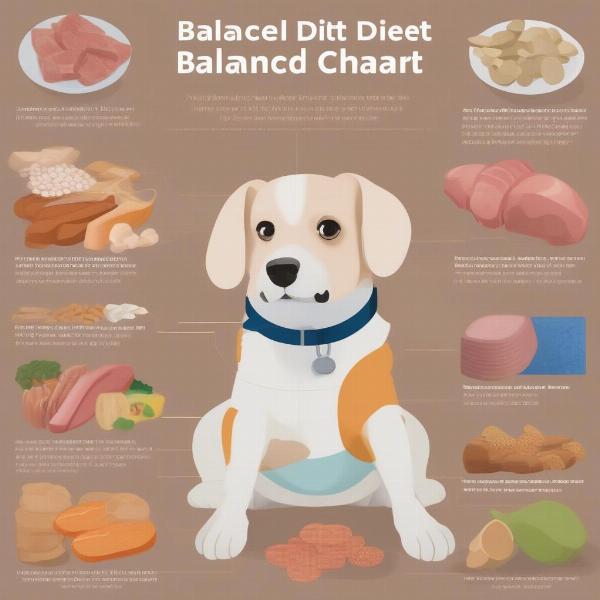Chili dogs are a beloved summertime treat for many humans, but can our furry friends indulge too? The short answer is no. While the name “chili dog nutrition” might pique your interest, chili dogs are generally not recommended for dogs. This article will delve into why chili dogs are unsuitable for canine consumption and offer healthier alternatives to satisfy your dog’s cravings. Let’s explore how to keep our four-legged friends happy and healthy.
Feeding your dog a chili dog might seem harmless, but the ingredients commonly found in this popular snack can pose significant health risks to your canine companion. Onions and garlic, frequent additions to chili, are toxic to dogs and can cause damage to their red blood cells, leading to anemia. The high fat content in chili dogs can also contribute to pancreatitis, a painful and potentially life-threatening inflammation of the pancreas. Additionally, the spices used in chili can upset a dog’s stomach and cause digestive issues.
Why Chili Dogs are a No-Go for Your Dog
While a small lick might not cause immediate harm, regular consumption of chili dogs can lead to serious health problems for your dog. The combination of high fat, spices, and potentially toxic ingredients like onions and garlic makes this human treat a dangerous choice for canines.
The Dangers of Onions and Garlic
Onions and garlic contain compounds called thiosulphates, which are toxic to dogs and can cause hemolytic anemia. This condition damages red blood cells, reducing their ability to carry oxygen. Symptoms of anemia can include lethargy, weakness, pale gums, and rapid breathing.
High Fat and Pancreatitis
The high fat content in chili dogs can trigger pancreatitis, a serious inflammation of the pancreas. This condition can cause severe abdominal pain, vomiting, diarrhea, and dehydration. In severe cases, pancreatitis can be fatal.
Spice Sensitivity and Digestive Upset
The spices commonly found in chili can irritate a dog’s digestive system, leading to vomiting, diarrhea, and abdominal discomfort. Dogs are generally more sensitive to spices than humans, and even small amounts can cause problems.
Healthy Alternatives to Chili Dogs for Your Canine Companion
Instead of sharing your chili dog, offer your furry friend healthier treats specifically designed for their nutritional needs.
Dog-Friendly Fruits and Vegetables
Many fruits and vegetables, such as carrots, apples (without the core and seeds), and blueberries, can make healthy and delicious treats for your dog. These options are low in fat and provide essential vitamins and minerals.
Commercially Available Dog Treats
A wide variety of commercially available dog treats are formulated to meet your dog’s nutritional needs. Look for treats that are made with high-quality ingredients and are appropriate for your dog’s size and age.
Providing a Balanced Diet for Your Dog
A balanced diet is crucial for maintaining your dog’s overall health and well-being. Consult with your veterinarian to determine the best diet plan for your dog based on their breed, age, activity level, and any existing health conditions.
 Balanced Dog Food Nutrition Chart
Balanced Dog Food Nutrition Chart
state fair mini corn dogs air fryer
Conclusion: Keeping Your Dog Happy and Healthy
While the aroma of a chili dog might be tempting to share with your furry friend, it’s essential to prioritize their health and well-being. Opting for healthy alternatives and providing a balanced diet will ensure that your dog stays happy, healthy, and by your side for many years to come. Remember, “chili dog nutrition” is a misleading concept when it comes to your canine companion.
FAQ
- Can dogs eat chili without the meat? No, even chili without meat can contain onions, garlic, and spices that are harmful to dogs.
- What should I do if my dog accidentally eats a chili dog? Contact your veterinarian immediately.
- Are there any types of hot dogs that are safe for dogs? Plain, cooked hot dogs without any seasonings or toppings can be given in moderation, but they are not nutritionally beneficial.
- What are some signs of onion or garlic toxicity in dogs? Lethargy, weakness, pale gums, rapid breathing, and vomiting.
- What are the best treats to give my dog? Consult your veterinarian for personalized recommendations based on your dog’s specific needs.
- Can small dogs have different dietary needs than large dogs? Yes, smaller breeds often require different nutrient ratios and portion sizes compared to larger breeds.
- How can I ensure my dog is getting a balanced diet? Feed them a high-quality dog food formulated for their life stage and consult with your veterinarian for personalized recommendations.
ILM Dog, your trusted resource for expert dog care advice, offers comprehensive information on all aspects of canine health, nutrition, training, and well-being. From breed selection to senior care, ILM Dog provides practical guidance and resources to help you navigate every stage of your dog’s life. Connect with us at [email protected] or +44 20-3965-8624 for personalized support. ILM Dog is dedicated to helping you provide the best possible care for your beloved companion.